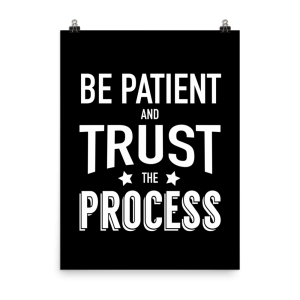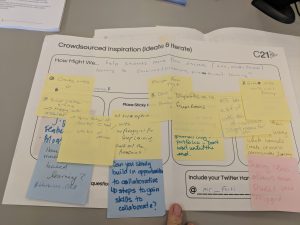This Cohort experience has been fantastic for thinking about my practice. I’ve spent many hours talking to colleagues, friends, family, and students about how to better my classroom, specifically in the area of helping students reduce their dependency on grades, and increase their appreciation of the process it takes to become a great learner.
Unfortunately, I haven’t found the time to put all these thoughts down on paper (or digital paper), which at times has made me feel that I’m missing out on the true Cohort experience of taking advantage of the community of people that are ready, willing, and able to help me out on my quest. Nevertheless, I’m going to try and put myself in my student’s shoes and trust the process. Although it hasn’t necessarily been top of mind thus far, I’m going to try and get better over the next few months.
On to my HMW question…
The last F2F was great in helping me realize what I want to examine in my classroom over this (and probably next) year. I originally had it as:
How Might We… help students move from discrete (solo, results, focused) learning to continuous (collaborative, process focused) learning?
The crowd-sourced place mat was as follows:
This has evolved in my head over the past few months to focus on something a bit smaller, while still keeping the essence of the question an ultimate goal. After looking at the work of @clovrics and subsequently @ehitchcock from a previous cohort, I was inspired to examine increasing and improving the level of written feedback I’m giving on my math assessments.
Basically, I’d like to take the Standards Based Grading approach of @ehitchcock and apply it to all of my formative assessments. In addition, I’d like to beef up the written feedback for each standard, to comment on the prerequisite skills the student might be having difficulties with. Since math is so sequential, I often find that the students’ misconceptions are not with current material, but in material learned in previous years. I’m hoping that in giving specific written feedback regarding the skill the student needs to improve upon, they will realize the importance of a continuous learning process that needs to take place across their entire math career. This is in direct opposition to the current grade based attitude I often see of “Just tell me what I need to know for this test” I’ve ended up with an HMW question of…
How Might We… enhance written feedback in my math class to improve student appreciation for the learning process and reduce their focus on grades.
I’ll be starting this with my Grade 10 students this week, and will hopefully have an update on Friday or shortly thereafter.


Great post and I am drawn to it because my HMW question is very similar to yours (HMW shift our students’ perspective of success to be more reflective of learning and less mark based).
I also teach Math and really like your idea of increasing the level of written feedback.
Let’s chat!
Love the title of your blog! Its seems like a few action plans this year are investigating ways to engage students with a passion for the “learning journey” instead of fixating on marks. A colleague recently shared some research with me that concluded that descriptive feedback is the most powerful tool for improving student learning – Black, Harrison, Lee and William (2003) so I think you are on the right track. I look forward to hearing about systems you might implement to make providing written feedback a sustainable idea!
Your title has landed on the key component of being involved in @cohort21! It is a process and it is the act of being able to enjoy the process and let it take you to new ideas, questions and possible solutions that makes it like anything else.
Here is one of my favourite resources for giving feedback in a Mathematics class specifically- https://justaskpublications.com/just-ask-resource-center/e-newsletters/msca/feedback-in-the-mathematics-classroom/
Looking forward to hearing how your class went this week!
Great work Andrew! I think Grade 10 is a good time to get students thinking about the skills and concepts that they should be focusing on to set themselves up for success in Grades 11 and 12. Working on their growth mindset and helping them to understand the importance of written feedback will be beneficial across all disciplines. I am so excited to see your plan in action over the coming months!
Andrew, this is something I’m also pondering. My HMW question is very similar but with a focus more on student reflecting on and identifying what they know and what they still need to know.
I completely agree with your statement about the attitude of “tell me what I need to know” that is present. Would be great to hear on Friday about your first few days of standard based feedback and wondering how your present the standards to your class during the learning cycle.